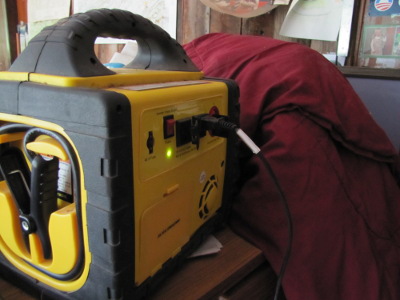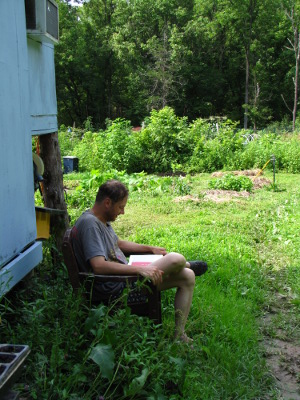
2011 summer power outage
 We
had a 22 hour power outage Monday and Tuesday, and we lost:
We
had a 22 hour power outage Monday and Tuesday, and we lost:
A few
sweet potato leaves
to marauding deer. (More proof that Mark's deer deterrents really work...as long as they're
running.)
Twenty
hard to find Light Sussex eggs when the battery
pack didn't last long enough to keep the incubator up to
temperature.
Sleep. I fretted over the
eggs far too much, waking up multiple times in the night, but  Mark was worse off since he
can't sleep without the white noise of a fan and didn't want to wake me
up by coming in to get a flashlight to read himself to sleep.
Mark was worse off since he
can't sleep without the white noise of a fan and didn't want to wake me
up by coming in to get a flashlight to read himself to sleep.
Every time the power
goes out, I think I've learned my lesson and I'll have backups on hand
next time. And every time, the ease of flicking that switch lulls
me into a false sense of security after a few weeks.
That said, we are slowly
improving by tweaking our life so that normal habits can go on if the
grid shuts down for a few days. Even though we need electricity
to pump water out of  our well and treat it with UV
light, I keep at least a few of jugs of drinking water under the sink
in case of emergencies. I always leave my solar flashlight
charging on the windowsill since I use it if we come home after dark or
if I want to go out at night to check on the chickens, so the
flashlight is also ready for power outages. And after our extended winter
power outage, we
deleted the exterior wood furnace and replaced it with fan-less wood
stoves, so we will now stay warm no matter what.
our well and treat it with UV
light, I keep at least a few of jugs of drinking water under the sink
in case of emergencies. I always leave my solar flashlight
charging on the windowsill since I use it if we come home after dark or
if I want to go out at night to check on the chickens, so the
flashlight is also ready for power outages. And after our extended winter
power outage, we
deleted the exterior wood furnace and replaced it with fan-less wood
stoves, so we will now stay warm no matter what.
On the other hand, we've
still got a ways to go, especially in the Mark comfort
department. Luckily, it was a mild enough day that hosing down
with creek water and sitting in the shade kept him cool, but I'm not
sure how he would have handled a power outage if the highs had been in
the mid nineties instead of the mid eighties. Let's see if I can
remember to ponder this problem now that the wide world of electricity
is once again at my finger tips.
Want more in-depth information? Browse through our books.
Or explore more posts by date or by subject.
About us: Anna Hess and Mark Hamilton spent over a decade living self-sufficiently in the mountains of Virginia before moving north to start over from scratch in the foothills of Ohio. They've experimented with permaculture, no-till gardening, trailersteading, home-based microbusinesses and much more, writing about their adventures in both blogs and books.
Want to be notified when new comments are posted on this page? Click on the RSS button after you add a comment to subscribe to the comment feed, or simply check the box beside "email replies to me" while writing your comment.

One way to get through an outage is to have backup power in the form of a battery pack or a generator set.
Depending on the average power that you want to have available and the outage time you want to cover, it is a pretty simple calculation to determine the battery capacity you need. If you need alternating current, don't forget to include convertor losses. Problem is, it will probably take more than you think. And batteries have a limited service life. You'll need to replace them after several years, which you need to factor into the cost.
There are generators based on Lister clone Diesel engines that will run on almost any kind of oil, even things like straight vegetable oil or used fryer fat.
But whatever you do, it will be a significant investment I think.
Unfortunately, things like air conditioners are real power hogs. Using the relatively cold water from the creek as a coolant medium (as we've discussed earlier) could save a lot of power there.
We're trying not to go into high cost systems that are only used for backup and are instead tweaking our lives so that the real necessities can be had without constant electricity. Our drinking water system and wood stove are the kind of direction we want to go in --- systems that we use all the time and that will last at least a few days with no input of energy.
For cooling, what I'm actually thinking of is getting around to making our porch sometime in the next year or two. It's amazing how a screened in porch will cool down on a summer night in our area --- without pavement to hold the heat, it's never too hot to sleep outside here.
What I would like a high tech solution to is a simple fan. Any ideas for a fan that works without electricity? I know we could just plan a battery pack specifically for a fan, but that seems like a high tech solution that depends on me remembering to charge the battery pack --- doesn't seem to happen unless I use it in my daily life.
Anonymous --- I considered various ways of keeping the eggs up to temperature (in addition to wrapping them in the blanket, which I did right away.) The problem is that I didn't want to have to get up every hour in the night to check on them and the power outage started at 10 pm.
In the long run, my plan is to have a broody hen do the work for me. Maybe next year!
We have the same battery pack and noticed an AC fan will drain it fast because of the inverter, but if you can get a DC fan that plugs into a cigarette lighter it ends up using less power and lasts much longer. The fan can be used in your vehicle as well if you don't have A/C.
I wonder if something similar to the stream powered generators could be made cheaply.
If you want a fan, or more specifically a cooling breeze, you'll need a power source one way or another.
A 12V battery permanently hooked up to the mains via a trickle charger is a relatively low-tech solution, though. And you cannot forget to charge it.
Hooking the fan up to a solar panel is another option.
If you don't want to depend on electricity, think about passive cooling like a cooling tower.
Another way to keep cool is to have a big thermal mass inside the house. A tank of water would do the trick.
Brian --- Great idea to go straight for a DC fan if we decide to use one with the power pack. I'm glad you decided to share your experience!
We've looked into hydropower and concluded neither of our creeks were appropriate, unfortunately.
Roland --- I like your distinction of "a cooling breeze" vs. a fan. That is a better way to look at it, and makes me lean more toward our screened in porch, separating out Mark's need for white noise into something separate. (He did dig up a little, battery-powered white noise generator, so that problem seems to be relatively solved.)
Good point about both the cooling tower and the thermal mass. I was thinking of trying to make the porch have a concrete slab for that reason, but Mark pointed out that the area we'd put the porch in would need a lot of drainage to put the porch directly on the ground. On the other hand, a 55 gallon drum, perhaps filled with rainwater somehow, would not only keep the porch cool, but would also make a good backup water source since we want that porch to be a summer kitchen too.
We had a long power outage last week, after some really strong winds - we lost power about 6pm, and got it back about 10am the next day. I know that probably doesn't sound like much to you guys, but that's the longest power outage I can remember in my life! And I've mostly lived in small rural towns.
We had all the usual stuff on hand - candles, matches, water bottle, torches, etc. Our kitchen stove runs off gas, so we were still able to cook dinner and make coffee etc. Our water supply comes from our rainwater tanks, though, so no power meant no water (no pump!). We filled buckets from the tap on the side of the tanks for flushing the toilets, and filled a drinking water bottle to keep in the kitchen.
I also put blankets over the chest freezers to keep them cool. My nearby father-in-law has a generator for when he goes away in his caravan, so if the outage went for much longer I was going to go and pick that up.
We did learn, though, that the candles we had were designed for ornamental use, not illumination. The water bottle was a bit small, too, meaning several trips out into the wind to fill it. So the next day I bought a 20 litre water container and some proper candles and holders. I also got some small LED torches for the kids.
There's nothing like a night without power to check that you have what you need for an emergency!
I'm shocked that that's the longest power outage you've ever had! Of course, "small rural towns" are probably a lot more likely to keep their power than an isolated farm, I guess, but we seem to have two or three power outages like that every year, and often some longer ones too. It probably has a lot to do with heavy tree limbs, and maybe eucalyptus tend to be lighter? (That's your dominant tree genus, right?)
We've found that our chest freezer is fine in power outages of 24 hours in the summer and 48 hours in the winter as long as we don't open it at all. And I highly recommend the solar flashlight option --- I got one on sale at the dollar store for a dollar about three years ago and it's been plugging along ever since!
Great point about power outages being good for checking over your emergency supplies! I always mean to run a simulated power outage, but can't get my act together to do it.